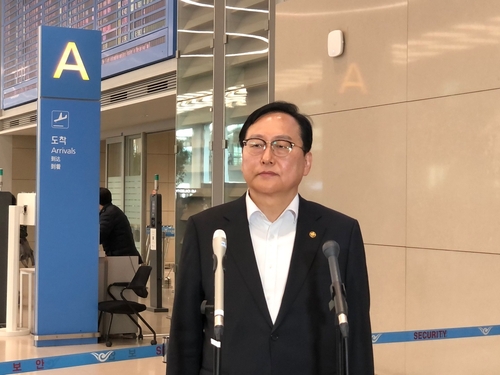- California Assembly OKs highest minimum wage in nation
- S. Korea unveils first graphic cigarette warnings
- US joins with South Korea, Japan in bid to deter North Korea
- LPGA golfer Chun In-gee finally back in action
- S. Korea won’t be top seed in final World Cup qualification round
- US men’s soccer misses 2nd straight Olympics
- US back on track in qualifying with 4-0 win over Guatemala
- High-intensity workout injuries spawn cottage industry
- CDC expands range of Zika mosquitoes into parts of Northeast
- Who knew? ‘The Walking Dead’ is helping families connect
U.S. shows willingness to handle tariff talks smoothly with S. Korea: trade minister
The United States has expressed a willingness to handle the tariff negotiations with South Korea and Japan as smoothly as possible, Seoul’s Trade Minister Cheong In-kyo said Friday, describing the U.S.’ openness as a key outcome of his visit to Washington.
“We held various discussions aimed at ensuring smooth trade relations with the Trump administration,” Cheong told reporters at Incheon International Airport upon returning from his two-day visit to Washington.
Cheong’s trip marked the first of its kind by a senior South Korean trade official since the Donald Trump administration announced country-by-country reciprocal tariffs, including 25 percent duties for South Korea, that took effect this week.

During his stay in Washington, Cheong met with U.S. Trade Representative (USTR) Jamieson Greer and other key officials to discuss the tariff issue.
“The biggest achievement of the visit was establishing a framework for item-by-item negotiations, particularly concerning steel and automobiles,” Cheong said, adding that Washington showed a willingness to reach an agreement with both Seoul and Tokyo in an “amicable” manner.
He also emphasized the importance of identifying the appropriate U.S. agency as Seoul’s main negotiation counterpart.
“Determining which U.S. agency would be our dialogue partner was crucial,” he said, noting that Greer will primarily lead the negotiations on behalf of Washington.
Cheong added that he thoroughly conveyed South Korea’s position on the issue of reciprocal tariffs.
“Greer actively listened to our stance, and shared the U.S. perspective and expectations for South Korea,” he said, describing the nature of the talks.
On Wednesday (U.S. time), President Donald Trump imposed a 90-day pause on reciprocal tariffs, saying that negotiations with countries requesting meetings over tariff issues would begin “immediately.”
At the same time, he warned China against retaliatory measures, raising tariffs against China to 125 percent.
In retaliation, China announced plans to raise tariffs on all U.S. goods from 84 percent to as much as 125 percent starting Saturday.
Regarding concerns that a potential U.S.-China trade conflict could negatively impact South Korean businesses, Cheong said the government would work closely with local companies to find optimal response strategies.
“We will actively seek support measures through close consultation with affected businesses,” he said.












